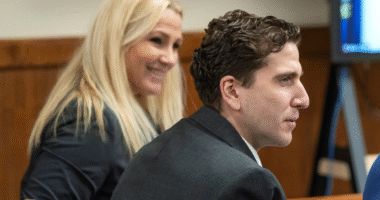Prosecutors in the case against Bryan Kohberger are disputing claims made by his lawyers that investigators obtained crucial evidence improperly. They are urging the judge to reject the requests to exclude this evidence from the trial.
In detailed filings released late on Thursday, prosecutors argued that the searches conducted on Kohberger, including his personal items, car, phone records, Apple accounts, and residences, were carried out correctly. They emphasized that it is up to the defendant to prove that the search was not valid.
Bryan Kohberger, a former criminology Ph.D. student at Washington State University, faces charges of four counts of first-degree murder and one count of burglary in relation to the tragic deaths of four University of Idaho students. The victims, Kaylee Goncalves (21), Madison Mogen (21), Xana Kernodle (20), and Ethan Chapin (20), were fatally stabbed in a house off-campus during the early hours of November 13, 2022.
A not guilty plea was entered on his behalf. The trial is scheduled for August 2025.
Lawyers for Kohberger have accused investigators of an overbroad attempt to build their case, arguing their search warrants cast too wide a net. But prosecutors, responding on Thursday to the defense’s lengthy series of motions posted Nov. 15, contend that taken together with other elements of the case, their probe for evidence was “sufficiently particular and valid” and “considering the information available” at the time, the Moscow detective seeking the information “could not reasonably narrow the scope further.”
The “warrant must allow the searcher to reasonably ascertain and identify the things which are authorized to be seized,” wrote Senior Deputy Prosecuting Attorney Ashley Jennings, citing legal precedent. She added, “broad language may be permissible where the warrant constrains the search to evidence of a specific crime.”
“The rationale is that ‘criminals don’t advertise where they keep evidence,'” prosecutors wrote. And since the potential evidence they sought “could be located in multiple formats and areas,” particularly electronic data, prosecutors here said, a wide enough investigative aperture is necessary.
“Applied to electronic devices ‘criminals can — and often do — hide, mislabel, or manipulate files to conceal criminal activity (such that) a broad, expansive search of the (device) may be required,'” prosecutors wrote, again citing legal precedent.
Jennings said the “seizure of items was limited to” the crime Kohberger is accused of committing — the killings of Madison Mogen, Kaylee Goncalves, Xana Kernodle, and Ethan Chapin in their off-campus home.
And though Kohberger has a right to privacy, that right does not shield criminal conduct, prosecutors said. In fact, it is because he had that right that they sought, and obtained, search warrants, they said.
Though the man accused of stabbing to death four college students in Nov. 2022 indeed “had a reasonable expectation of privacy in his vehicle located at his parents’ residence,” there was “substantial probable cause” to search it, prosecutors said. And Kohberger also had a “privacy interest” in his AT&T account and phone records — and “as such, the State sought and was granted a search warrant to review those records.”
The Thursday filings were accompanied by a series of requests to seal corresponding exhibits meant to bolster prosecutors’ argument.
Prosecutors didn’t include in Thursday’s filings an extensive address of Kohberger’s challenge to DNA evidence, or the search of his Amazon account.
Judge Steven Hippler, who is now overseeing the case in Boise, has not yet scheduled a public hearing on the matter.
Copyright © 2024 ABC News Internet Ventures.

















